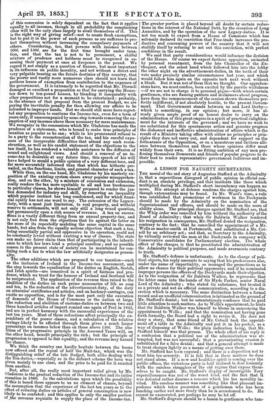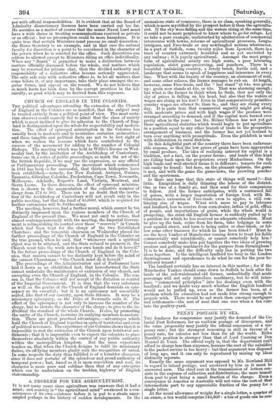A LESSON FOR NAUGHTY SECRETARIES.
Tax moral of the sad story of Augustus Stafford at the Admiralty is, that a supercilious disregard of public opinion in official con- duct is an obsolete privilege, and that incidents like those which multiplied during Mr. Stafford's short incumbency can happen no more. His attempt at defence confirms the charges against him,
though extenuatione may be found. In Mr. Ward's time a rule was established that promotions of workmen in the Dockyards should be made by the Admiralty on the nomination of the Superintendent and officers and should, be made on the score of ability alone. The principal charges against Mr. Stafford are, that the Whig order was cancelled by him without the authority of the
Board of Admiralty ; that when Sir Baldwin Walker tendered his resignation in consequence, Mr. Stafford denied the resignation, contrary to the fact ; that he cancelled the appointment of a Mr. Wells as master-smith at Portsmouth, and substituted a Mr. Cot- sell by an arbitrary act ; and that, as Secretary to the Admiralty, he virtually reviewed the men at the Dockyards in company with Conservative candidates for Parliamentary election. The whole effect of the charges is that he prostituted the administration of the Admiralty to political purposes, and made averments contrary to truth.
Mr. Stafford's defence is unfortunate. As to the charge of poli- tical objects, his reply amounts to saying that his predecessors also, under the name of impartiality, so managed the promotions as to allow no chance for their political opponents/ and if he nominated improper persons the officers of the Dockyards made their objection. As to the resignation of Sir Baldwin Walker, he represents that the letter came into the hands of Sir Hyde Parker, senior Naval Lord of the Admiralty ; who stated its substance, but treated it as a private and not an official communication, according to a dis- cretion which is necessary. The same distinction between a formal record and an unofficial communication is intimated as the ground of Mr. Stafford's denial ; but he ostentatiously confesses that he paid little attention to such matters. As to Wells's appointment, he hints that Sir Baldwin Walker was himself to blame in announcing the appointment to Wells ; and that the nomination not having gone
forth formally, the Board had a right to revise it. Ile does not deny a story, that some friend of Mr. Cotsell took the appoint- meat off a table in the Admiralty and put it in his pocket, as a way of disposing _of Wells; the plain indication being, that Mr. Stafford himself was that person. The whole effect of his reply is a confession that a political use of the administration was at- tempted, but was not successful; that a prevaricating evasion is substituted for a false denial; and that a general attempt is made to treat charges lightly as a means of getting over them. Mr. Stafford has been exposed ; and there is a disposition not to treat him too severely. It is felt that in these matters he does not stand alone. If "a new and healthier spirit is coming over the public offices, the victorious party is half inclined to deal leniently with the careless stragglers of the old regime that expose them- selves to be caught. Mr. Stafford's display of incorrigible Tory superciliousness was not of the worst kind, and the fact that it was defeated rather disarms a censure which his lax morality in- vited. His careless manner was something like that pleasant im- pudence which takes possession of a gentleman who has been
i
lunching earlier and more freely than he s accustomed to do. He cannot be exonerated, put perhaps he may be let off. Mr. Stafford's disgrace should be a lesson to gentlemen who tam- per with official responsibilities. It is evident that at the Board of Admiralty discretionary licences have been carried out too far. lie assumes as a matter of course that the senior Naval Lord must have a wide choice in treating communications received as private or as official : but no presumption could be more hazardous. It is quite true that certain Ministers must possess no small discretion : the Home Secretary is an example, and in that ease the natural faculty for discretion is a point to be considered in the character of the person when he is selected for the office. Such discretions can seldom be allowed except to Ministers filling an office individually. When any " Board " is permitted to make a distinction between matters officially discussed before the whole, and matters which may be reserved for private chat, then the divided authority and responsibility of a collective office become seriously aggravated. The only safe rule with collective offices is, to let all matters that come before it, of any importance, take their place amongst the re- gular forms, and appear on the record. We do not believe that so much harm has been done by the corrupt practices in the Ad- miralty, as good which may be derived from this exposure.



























 Previous page
Previous page